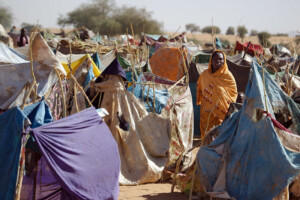Interview: ‘Drastic changes needed to heal Sudan’s economy’
An economic expert says that drastic changes are needed in Sudanese politics to deal with “the tragic economic situation plaguing the country”.
An economic expert says that drastic changes are needed in Sudanese politics to deal with “the tragic economic situation plaguing the country”.
In an interview with Radio Dabanga, banking expert Hafez Ismail, said that “the only approach to addressing the decline in the value of the Sudanese Pound against foreign currencies is by attracting investment from international financial institutions,” pointing out that “this cannot be achieved unless a radical change of political situation takes place”.
Ismail attributes the rapid decline in the value of the Sudanese Pound against foreign currencies to “the poor infrastructure of the Sudanese economy, the trade deficit balance of payments, and inflationary borrowing from the banking sector to cover the budget deficit.”
He attributes the government’s failure to address the decline in the value of the Pound to the weakness of its relations with international donor institutions. He also cites “the weakness of credit because of the wars and failure of repayment, US sanctions on Sudan, the government’s non-signing of agreements that allow funding from international institutions, and the declining economic conditions of Gulf states upon which the government depends for investment.
“The government has failed to get development loans, and has only received humanitarian activity loans. The impact of the collapse of major economic projects in Sudan such as the El Gezira Scheme has had a vast impact on the economic conditions and exchange rates.”
'Basic Sudanese exports have declined significantly in exchange for increased imports.'
Oil revenues
Ismail criticised the government for not investing its oil revenues in the construction of key economic sectors such as agriculture. He decried “its full dependence on oil to bring in foreign currency before the secession of South Sudan”.
He revealed a significant decline in the basic Sudanese exports such as cotton and gum arabic in exchange for increased imports, blaming the government for “resorting to the economy of brokerage rather than focusing on the production of key commodities such as cotton, gum arabic, environmental protection and transformation projects.”
Ismail stressed that “the infrastructure of the Sudanese economy needs to set-up a long-term plan. It needs investment in the agricultural sector, technology, roads, land reform, and agricultural manufacturing industries.”
Crop markets
He cited a rare precedent on Tuesday, when El Gedaref crop markets witnessed lack of sale in the auction: “No sesame crop was bought; not even a pound out of the 2,085 quintals was sold”.
The farmers and traders demanded the state intervention to set prices for the farmers to sell their crops at remunerative prices so as to enable them to enter the new agricultural season.











 and then
and then